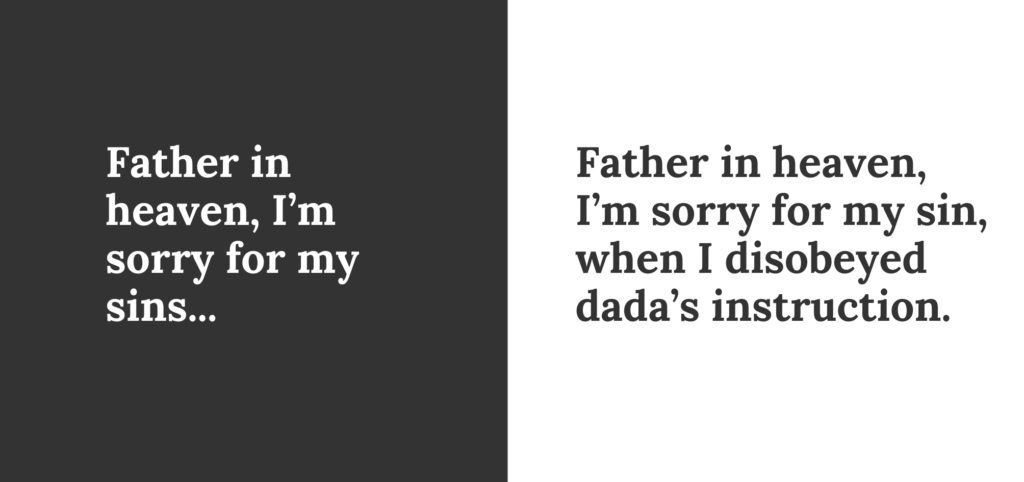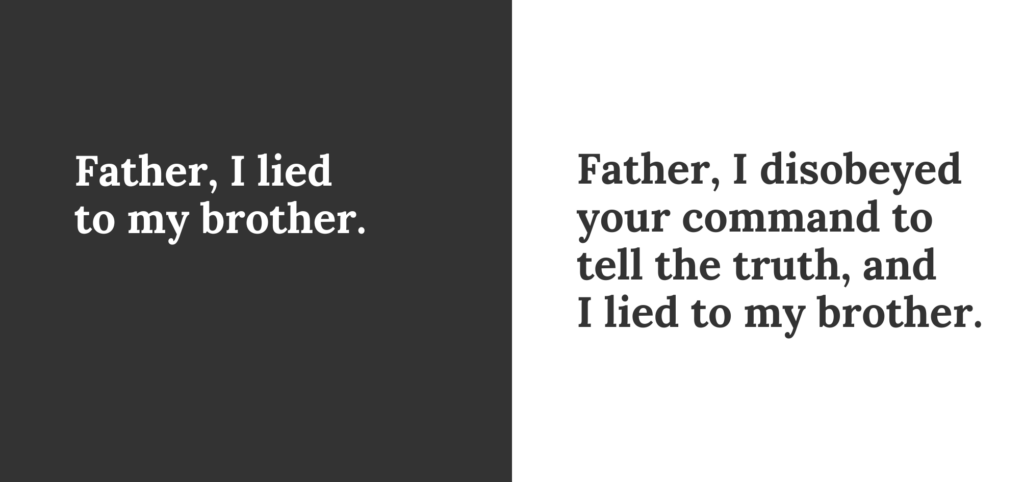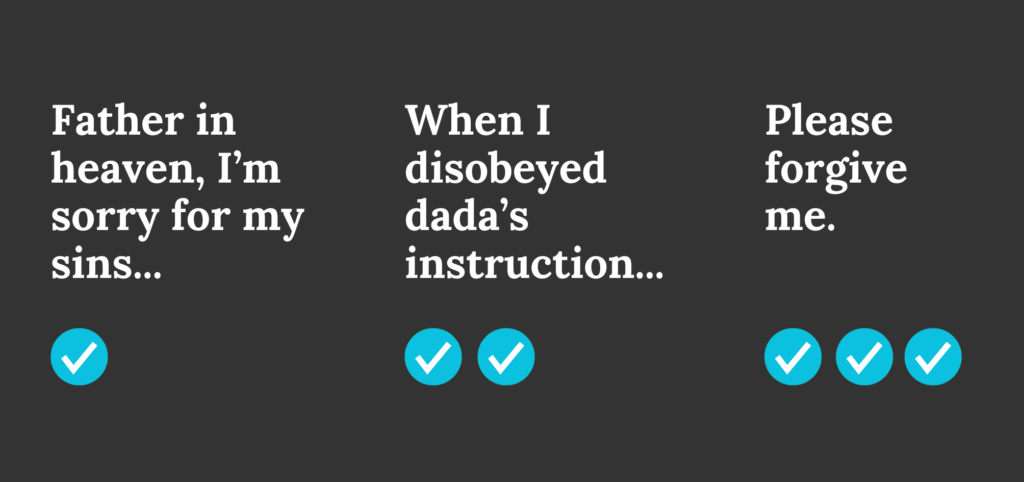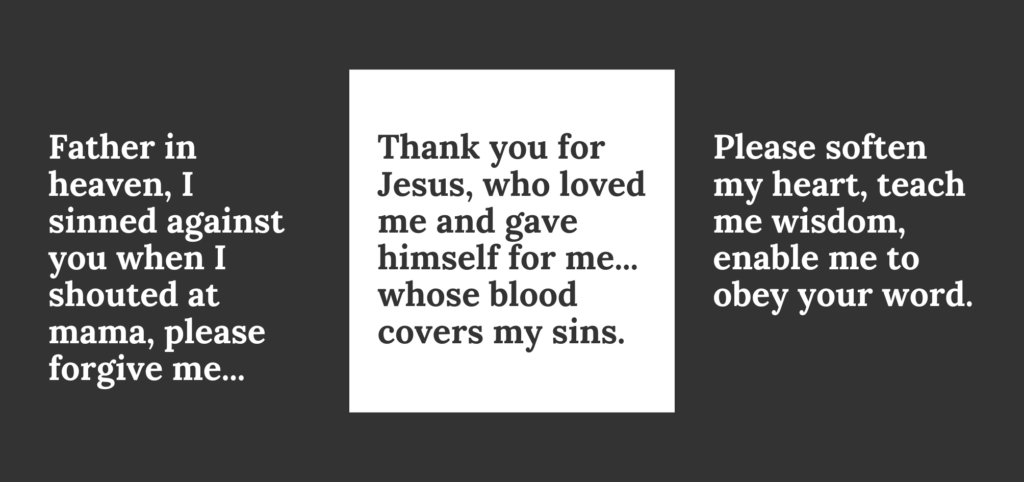The Anatomy
of Confession
The elements of confession that humble the heart and form the mind.
Robust Confession of Sin Has to Be Learned
If you’ve led young children in confession of sin you know that confession is not easy. Or rather, it isn’t obvious to them what they should say. This is because to confess sin in a substantial way is to express an underlying theology. Children need help with this! And it is worth teaching them.
Few things could be more important in forming the hearts and minds of children than learning how to biblically, thoroughly, confess sin. How relevant will Christ be to them if they grow up only saying “sorry” to each other, and rarely considering the vertical dimension of their sin? The below is not an exhaustive list of what could be included in confession, but these each seem to me to be necessary, given what the Bible teaches about sin, grace and forgiveness.
1. Acknowledgement of the Specific Sin
We have seen our children develop numerous habits of confessing sin. The first is to say sorry for their sins in general rather than to acknowledge the particular sin in question. Good confession should include the words “I’m sorry.” But of first importance is the acknowledgement of a specific sin. Children are immediately stretched by this, because they will need to put into words what they have done, and they often don’t really know until they do this. We should avoid general statements about how we feel about our “sins” and encourage our children to acknowledge the specific sin they need to confess.

2. Naming the Offended Parties
When confession is general it can also become abstract, not very close to us. But sin is not abstract, it is personal. It creates a rupture in the relationship between those involved. It is hard to avoid this reality when we name the person we have sinned against. But we should go even further than that and follow David’s example in Psalm 51. “Against you, you only have I sinned, and done what is evil in your sight.” David did sin against fellow creatures as well as God. But he understands the nature of sin and can therefore speak in this way, accenting the vertical dimension of his sin, which is the primary one.
Sin is first and foremost a rebellion against the Creator, and because of this it damages and spoils relationships in creation. To acknowledge that I have spoken harshly or been impatient with one of my children will sting. But to acknowledge that in doing so I have sinned against the God who has given my children to me to love and protect can bring me to my knees. We should teach our children that all sin is primarily against God and is therefore weighty and serious.

3. Asking for Forgiveness
It is shockingly easy to skip this part entirely. We have heard many confessions like this: “Father in heaven, I’m sorry for my sins today… please help me not to do it again… in Jesus’ name I pray, amen.” This is a good start, but we can do better. Notice, we have not actually asked for forgiveness in this prayer! When I have prompted the children to actually say the words: “Please forgive me,” I realize this is the most vulnerable part of confession, which may be why it is often skipped.
Here we place ourselves entirely at the mercy of God, and we risk rejection. But the heart that actually asks for forgiveness understands that a real rupture has occurred and wants repair and reconciliation. This is where a sinner really does business with God: “Have mercy me, a sinner.” “Lord, remember me when you come into your kingdom.” These are such striking examples of confession because they place the sinner entirely at the mercy of God. This is where the transaction really takes place. And are there sweeter words than those that followed these confessions? Justified… paradise.

4. Thanksgiving for Grace
Only the gospel of grace enables a person to stand so vulnerable before a holy God. Only in the face of unfathomable acceptance could we repeatedly risk rejection. Only with the assurance of love so amazing, so divine, could we acknowledge that we have been so unlovable. This is why I always prompt the children to give thanks for the grace, mercy, and love of God in their confessions. I want them to remember in these moments the sufficiency of Jesus’ blood to entirely cover and cleanse them, and the love of God which sent Jesus into the world before, not after, their confession and repentance. The prodigal son needed to hit the bottom of his guilt and shame with the pigs. But the love of God is such that he was not permitted to remain there. The father’s warm embrace and full pardon were the necessary completion of his story.

5. Request for Repentance
It is good for us to remember that we confess sin not only to make what is wrong right with God, but to begin turning away from the sin by which we went wrong. Confession and repentance are good friends. We should keep them together. And our children will need us to help them form this connection. Confession of sin is the first step along the path of putting sin off. But this cannot be done by human strength. Repentance is a miraculous thing. We need to ask God to enable us to turn from the sin we are confessing. It is good to orient the children to the road. They have fallen, as we all do. Everybody falls. But God calls them to repentance, calls them to come further along the path, and He will provide grace for the journey. Good confession should not give the impression that this is a cyclical procedure, that the children are stuck in a time loop. Good confession requests repentance, because it believes God is at work not only to forgive, but also to restore and recreate.
Lewis makes a brief comment about Euctace after his conversion in Voyage of the Dawn Treader. “It would be nice and fairly nearly true, to say that ‘from that time forth, Eustace was a different boy.’ To be strictly accurate, he began to be a different boy. He had relapses. There were still many days when he could be very tiresome. But most of those I shall not notice. The cure had begun.” What an encouragement this is! Eustace had been awful. His sin was primarily against Aslan, and consequently he was a terror to those around him. But on the other side of his sin was progress. Repentance. “The cure had begun.” A request for repentance in confession is a good reminder to our children that a cure has begun. Good confession makes a declaration of repentance, because it knows God will continue to provide it.